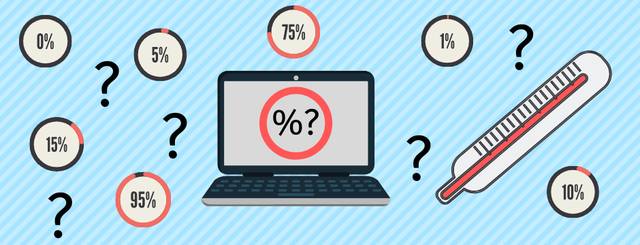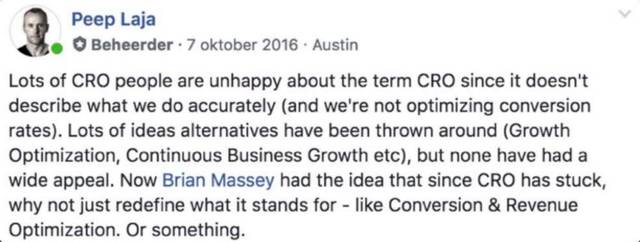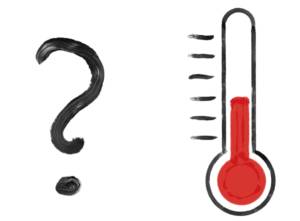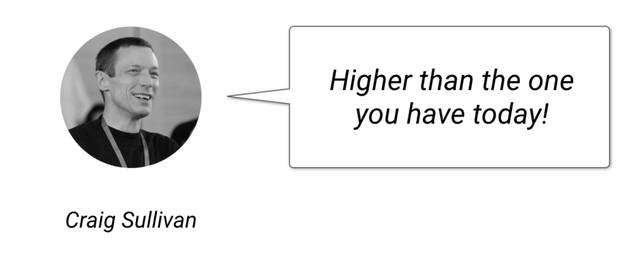
When thinking about your conversion rate, there are really two questions you want answers to.
But let's start with the crucial question: Is the conversion rate actually important?

Bryan Eisenberg is often called “The Godfather of Conversion Optimization.” He started his company and began helping American companies with their conversions somewhere in the early 2000s.
Brian had a background in search engine optimization, and in the beginning, it was important for him to attract search traffic to his service. So he did his keyword research and found that there were a lot of searches for “conversion rate.” He decided that this thing he was going to launch should be called “Conversion Rate Optimization - CRO,” and now he would rank as number 1 on it.
But unfortunately, he was a bit sloppy with his research. It turned out that most of the search traffic was about converting from Celsius to Fahrenheit and from Yen to Dollar and similar. Very little of all that traffic was about measuring and addressing some kind of conversion on a website.
So thanks to Bryan's somewhat sloppy keyword research, we now have an entire industry stuck in CRO or Conversion Rate Optimization.
Most industry experts agree that it should really be called “Conversion Optimization.”
This is what Peep Laja, who runs Conversion XL, says:

The conversion rate is actually completely uninteresting - let's take a couple of examples to understand why.
At one of my first conversion conferences, a German mobile operator presented their optimization project.
They had set up a new team tasked with improving the conversion rate. They started by analyzing the conversion rate for their various Adwords campaigns. One of the first things they discovered was that they had virtually no conversion from customers in Austria. And then they realized it was because they were buying ads in the German-speaking part of the world, but they had no operations in Austria. There was nothing for customers to buy there. Then they came up with the brilliant idea to turn off all Adwords advertising in Austria. And voila, the conversion rate went up.
Was this really a “conversion optimization project” strictly speaking? Well, maybe not quite according to my definition. Here's the thing: If the conversion rate is your most important KPI, you can always improve it by turning off your worst-performing traffic. Simple, right?
"Here's the thing: If the conversion rate is your most important KPI, you can always improve it by turning off your worst-performing traffic. Simple, right?"
So it really comes down to choosing and setting your key metrics correctly. And then I would argue that the important thing is to optimize the number of conversions - NOT the conversion rate. Let's take another example.
You are an e-commerce manager on an e-commerce site. Someone comes to you with a campaign idea. You can buy enormous amounts of junk traffic in an ad network that consists of a large number of low-quality sites. You can expect an incredibly low conversion rate, but the proposal from the seller is also ridiculously cheap.
Let's say you have a goal that your customer acquisition cost (CAC) should always be under 50 SEK. In this case, it looks like it will be 10 SEK even if you account for a super low conversion rate. Should you say yes or no to this proposal?
If the key metric you are measured on is the conversion rate, then you should say no. If your key metric is the number of conversions that do not exceed your CAC goal, then you should say yes.
The background to this blog post is the question of what a good conversion rate actually is - where should I be? And - where are my competitors?
Let's say you find out where your competitors are and where you should be - then the next important question is what you should do to improve the conversion rate.
This is probably where our reluctance to talk about conversion rate begins. The important thing is not what conversion rate you have but what you do to improve it. Or as the Godfather of Conversion Optimization himself says:
“Knowing your conversion rate is like knowing your temperature when you're sick - it won’t tell you what is wrong”

Another of our industry colleagues, Craig Sullivan, usually responds like this when his potential customers ask what conversion they could get if they worked with him:

So the most important thing is not what conversion rate you have, but what you could do to improve it.
Trust me – if you haven't actively worked on improving your conversion rate, you have a lot to gain regardless of what conversion rate you have today.
We started this blog post with two questions:
Now we have probably concluded that the conversion rate is not that important, but rather it is about the number of conversions.
But it is still interesting to try to find out what affects the conversion rate.
And guess what – we will do that in the next blog post!